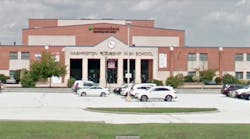Mercury emissions prompt New Jersey district to move gym classes
Physical education classes at eight Washington Township (N.J.) schools are being relocated after officials determined that rubber flooring in gymnaisums has been emitting a mercury vapor into the air.
NJ.com reports that replacing the floors could cost the Washington Township district $3.2 million to replace. The board is expected to discuss the situation at a board meeting Wednesday.
The mercury contamination has been detected in eight of the township’s 11 schools—all six elementary schools as well as Bunker Hill Middle and Washington Township High. The mercury had been used during the installation of rubberized flooring before 2000 and several years thereafter. Deteriorating floors are emitting mercury vapors, which can be hazardous, officials say.
The floors are in gym and recreation rooms, including a dance studio at the high school.
The remediation would involve removing the rubber flooring and some layers of whatever is underneath, typically concrete.The district wants to have it completed by the beginning of the next school year in the fall.
“Due to the prospect of fair weather now that spring has arrived, and with an abundance of caution, all gym classes at our six elementary schools, Bunker Hill Middle School, and Washington Township High School will be relocated both in and out of the building to continue to provide health and physical education instruction and dance instruction,” School Superintendent Joseph Bollendorf said in a letter to parents.
“Although the test results and data presented by our District engineer and certified industrial hygienist indicate that our gyms tested well below the (state Department of Health) guidelines, and that the continued use of the gyms does not present any short- or long-term health risk based on the most advanced air quality testing, we feel this prudent step will put the minds of our community, our staff, and our students at ease.”
An engineering report for the district concluded that boosting ventilation to the affected areas keeps levels from exceeding state standards for mercury emissions.
The mercury was used to cure the installation of the rubber to the floor and was not required to be cited as a material used in construction before it was banned by the federal government in 2000, district officials say.
About the Author
Mike Kennedy
Senior Editor
Mike Kennedy, senior editor, has written for AS&U on a wide range of educational issues since 1999.
